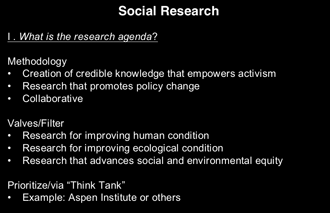|
|
Emerging research agendas in architecture:
Social Research
Workshop Report
Sherry Ahrentzen, PhD, Assoc. AIA,
Arizona State University (Lead)
Jonathan Fischel, AIA,
Wright Heerema Architects
Maurya McClintock, Assoc. AIA,
ARUP/Anshen + Allen
Ken Ross, FAIA,
Watkins Hamilton Ross Architects
Sharon Sutton, PhD, FAIA,
University of Washington
Sharon Sutton:
We found it would be a little bit presumptuous to develop this research agenda. We have instead developed a value filter for how that agenda should be established. It has three characteristics: It should improve the human condition. It should improve the ecological condition. And it should advance social environment effectively.
We have some principles for methodology that came out of the keynotes and, like the presentations that we’ve heard, have put us all on the same page. One is the creation of credible knowledge—in other words, research that promotes change and, specifically, research that promotes policy change. It’s political change, and that is collaborative.
To get to a research agenda, we’ll follow along this methodology with the idea of the AIA establishing a think tank, budget permitting. For example, the Aspen Institute had a think tank on comprehensive community development that went on for a couple of years. Numerous foundations contributed all of their ideas about comprehensive community development, and the Aspen Institute organized the results. I mean, you’d think that that would be the sort of effort appropriate to develop the research agenda.
>
01 02 03 04 05 |
|


|
